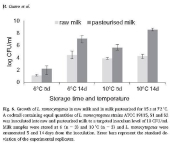
















Lila Stevens wrote:Well, I seem to be pregnant again
Lila Stevens wrote:How is listeria transferred to the milk? A Google search seemed to indicate that if a goat has listeria, they will show pretty severe symptoms... you will have a pretty sick goat and probably won't be drinking their milk. But what if they very recently contracted it, and they transfer the disease to you before showing symptoms? It also seems that goats mainly get this disease from being fed silage... well, I don't feed silage. I am not stating any of this as fact... this is simply what I have read and am looking for clarification on.
Lila Stevens wrote:Then, E-coli. I understand this comes from fecal contamination, right? So if I avoid that, should be ok, right? I keep things as clean and sanitary as possible, but of course nothing is 100%. For example, I brush my goats before milking to avoid hair dropping into the milk. But if a hair does drop in the milk, could it contaminate it with E Coli, if, say, the goat was lying on some of its own feces before that? And is salmonella transferred the same way?
Lila Stevens wrote:Anything else I should be thinking about?
http://www.cloud9farms.com/ - Southern Colorado - Zone 5 (-19*f) - 5300ft elevation - 12in rainfall plus irrigation rights
Dairy cows, "hair" sheep, Kune Kune pigs, chickens, guineas and turkeys









| I agree. Here's the link: http://stoves2.com |

